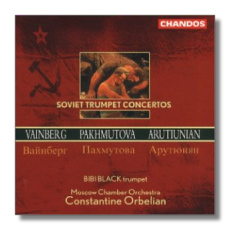
The Internet's Premier Classical Music Source
Related Links
- Latest Reviews
- More Reviews
-
By Composer
-
Collections
DVD & Blu-ray
Books
Concert Reviews
Articles/Interviews
Software
Audio
Search Amazon
Recommended Links
Site News
 CD Review
CD Review
Soviet Trumpet Concertos

- Alexander Arutiunian:
- Concerto for Trumpet and Orchestra
- Variations for trumpet and Orchestra
- Alexandra Pakhmutova: Concerto for Trumpet for Orchestra
- Moysey Samuil Vainberg: Concerto for Trumpet and Orchestra
Bibi Black, trumpet
Moscow Chamber Orchestra/Constantine Orbelian
Chandos CHAN9668 DDD 72:05
This disc of "Soviet Trumpet Concertos" is a tonic for the troops. The four works that it contains are easy to enjoy because of their melodic generosity, but they're hardly familiar, and they blow across the ears like a fresh breeze. (The only one I've heard before is the Vainberg, in an old Melodiya recording by Russian trumpet virtuoso Timofei Dokshitser.)
Alexander Arutianian (b. 1920), like Aram Khachaturian, is Armenian. Their works share some of the same exotic colors. His Trumpet Concerto (1950) is in a single movement but otherwise retains a full-scale concerto's structure. The optimistic theme that bookends the work is irony-free, and the concerto's central section features a sultry, sinuous melody – first for clarinet and then for muted trumpet – that sounds like an Armenian blues. Like, the concerto, Arutiunian's clever set of five Variations for Clarinet and Orchestra lasts for a wholly enjoyable quarter-hour. It is less obviously "ethnic" than his concerto, but no less distinctive. An emphasis on slower tempos gives Black the opportunity to show off her very accomplished legato playing.
Alexandra Pakhmutova (b. 1929) wrote her Trumpet Concerto in 1955. Her other works apparently are written in a melodic style – both populist and nationalist – that pleased the Soviet regimes, and yet I get the feeling that it is really her own heart that she has been following all these years: there's nothing ungenuine about all this lyricism. Also a single-movement concerto, her work is more Romantic than Arutiunian's. At times, this concerto sings with an intensity that is familiar from Rachmaninoff's writing earlier in the century.
Moisei Vainberg was born in 1919 and died in 1996. He fled to the Soviet Union from Warsaw in 1939, when the Nazis invaded his native Poland. His works are slowly becoming better known in the West, and this Trumpet Concerto, written in 1967, could lead the charge. The opening movement ("Études") alternates between mystery and fairground mockery, but it never turns acid. "Episodes," the second movement, is just that: a series of connected yet distinct gestures that serves as a laconic slow movement. The equivocal mood produces a vague (but not dangerous) unease. The work reaches an unexpected conclusion with the finale, designated "Fanfares." In the spirit of Shostakovich's last symphony, Vainberg quotes trumpet fanfares from well-known works by Rimsky-Korsakov, Bizet, and Mendelssohn. Vainberg's purpose is unclear, but the effect is both gay and unsettling. The concerto ends magically, as the orchestra quietly picks over the soloist's discards.
Black excels when she is required to make her instrument sing, but she is an impressive musician overall, and she plays with deftness, agility, and attractive tone. Orbelian, also recognized as an excellent pianist, has conducted the Moscow Chamber Orchestra since 1991. He and his Orchestra give Black able support and show a natural understanding for this music. The recording, made in Moscow's Mosfilm Studios is good.
Copyright © 2000, Raymond Tuttle


















